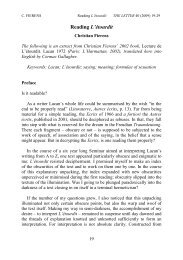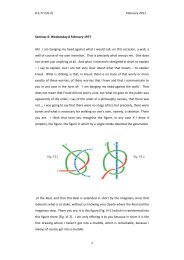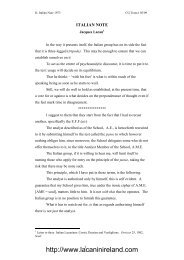LE PARI DE PASCAL - PASCAL'S WAGER ... - Lacan in Ireland
LE PARI DE PASCAL - PASCAL'S WAGER ... - Lacan in Ireland
LE PARI DE PASCAL - PASCAL'S WAGER ... - Lacan in Ireland
You also want an ePaper? Increase the reach of your titles
YUMPU automatically turns print PDFs into web optimized ePapers that Google loves.
would be no harm to try to situate the position of freedom of thought that<br />
<strong>Lacan</strong> def<strong>in</strong>es as Utopia, mean<strong>in</strong>g it occurs nowhere.<br />
At one time, I was <strong>in</strong>terested <strong>in</strong> the works of Thomas Moore and<br />
Frances Bacon and all of those who have contributed to the literature on<br />
Utopia. And it is very edify<strong>in</strong>g if one considers what this literature, <strong>in</strong> a<br />
sense, puts on the stage or produces <strong>in</strong> its notion of contest<strong>in</strong>g what is<br />
considered normal or the law.<br />
Pascal was a subject who was awake. He lived his life <strong>in</strong> a wak<strong>in</strong>g<br />
state and he worked even if the seal of sublimation marked this life. All of<br />
his biographers have noted that, <strong>in</strong> effect, from his earliest years and up to<br />
the end of his life he was <strong>in</strong>terested <strong>in</strong> absolutely everyth<strong>in</strong>g. And<br />
perhaps we could ask the question of whether the function of wak<strong>in</strong>g has<br />
not got someth<strong>in</strong>g to do with be<strong>in</strong>g a genius, because it would perhaps be<br />
a way of gett<strong>in</strong>g out of the idea of genius if we just said they were awake.<br />
At least we can say that <strong>Lacan</strong> was a genius and certa<strong>in</strong>ly someone who<br />
was wide-awake.<br />
In fact, wak<strong>in</strong>g up is <strong>in</strong> a sense a function that belongs to the real.<br />
As <strong>Lacan</strong> says, when you f<strong>in</strong>d it the real is what wakes you up. What was<br />
it then that woke Pascal up<br />
Even though <strong>Lacan</strong> warns us of the pitfalls of biography when<br />
talk<strong>in</strong>g about Pascal <strong>in</strong> the sem<strong>in</strong>ar. It is crucial that psychoanalysis takes<br />
note of someth<strong>in</strong>g. The young Pascal as a one-year-old produced a very<br />
serious anorexia with convulsions to such a severe degree that his family<br />
thought he was go<strong>in</strong>g to die of them. What is <strong>in</strong>terest<strong>in</strong>g and what <strong>Lacan</strong><br />
po<strong>in</strong>ts out is that Pascal's father had noted what the reasons were for these<br />
effects. (One did not talk about causes at this time). What produced the<br />
convulsions or 'black rages' of this child There were two reasons, the first<br />
be<strong>in</strong>g the cont<strong>in</strong>uous flow<strong>in</strong>g of water. The second reason <strong>Lacan</strong><br />
considered as <strong>in</strong>terest<strong>in</strong>g: while he could tolerate his parents com<strong>in</strong>g <strong>in</strong>to<br />
his room one by one, and kiss<strong>in</strong>g him, he could not tolerate when they<br />
came to see him together nor could he tolerate them show<strong>in</strong>g any sign of<br />
tenderness <strong>in</strong> front of him.<br />
Perhaps we can see <strong>in</strong> this a pre-figur<strong>in</strong>g or a reference to the flaw<br />
114














